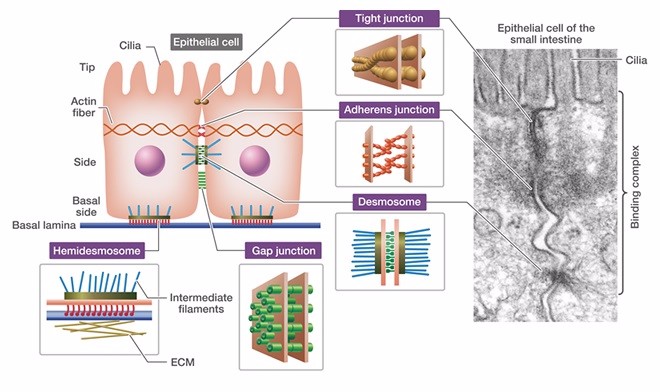Cells interact with each other throughout their lifetime and can attach to a surface, substrate or another cell. This process is so-called cell adhesion mediating by specialized protein complexes. The interactions between cells can be transient or long-lived based on the cellular structures and composition of the adhesion complex. Cellular adhesion is essential in maintaining multicellular structure and enabling to link cells in multiple mode such as adhesion junctions, tight junctions, desmosomes and focal adhesion.

Cellular adhesion plays a vital role in stabilizing the cells position and supporting tissue integrity, for the stability and rigidity. Dysfunction of cell-adhesion occurs in a wide range of diseases including cancer, osteoporosis and arthritis. Reduced intercellular adhesiveness allows cancer cells to disobey the social order, resulting in destruction of histological structure, which is the morphological hallmark of malignant tumors. Thus, it is also important to understand how cells interact and coordinate their behavior in multicellular organisms.
Cell adhesion involved in cell communication and regulation including cell differentiation, cell cycle, cell migration and cell survival. These essential functions of cell adhesion attract tremendous interest in developing methods for measuring and studying cell adhesion properties. The study of cell adhesion could be categorized into two parts: cell adhesion attachment and detachment events. Both events in cell adhesion are widely explored in many fields including cellular biology, biomedical and engineering fields. Various techniques were applied to measure cell adhesion and investigate the cell signaling pathways of cell adhesion through the study of single cells as well as the populations of cells.
The field of cell adhesion cover a wide range of important applications including fundamental single cell adhesion behavior(morphology, migration, kinetics) and the cell signaling pathways that how the physiological factors(temperature, pH, fluid flow), treatments(chemical, drugs, toxic, different substrate) and conditions affect cell adhesion, cancer metastasis studies and tissue engineering. Single cell adhesion characterization can lead to the development of biomarkers for early disease diagnosis at the cellular level. Cell adhesion population studies are also essential in analyzing the potential of drug treatments, understanding the dynamic mechanism of cell adhesion and finding a cure for many diseases. Both single cell and population studies are equally important in the fully understanding of the behavior and function of cells in the human system.
Creative Bioarray offer diverse cell adhesion assays and our experienced and excellent experts can design feasible cell adhesion assays to meet your different requirement.

*If your organization requires signing of a confidentiality agreement, please contact us by email.
Online Inquiry